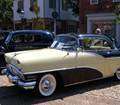|
Unleaded
|
||||
|---|---|---|---|---|
|
Just popping in

|
I am about to acquire a 48 2262. Can I run unleaded or do I need an addative? Marvel? Lead substuitute? Thanks guys!
Posted on: 2016/6/16 19:02
|
|||
|
||||
|
Re: Unleaded
|
||||
|---|---|---|---|---|
|
Forum Ambassador
|
G'day Mr_Yeti,
 to PackardInfo. to PackardInfo.Congratulations on your '48 2262, I invite you to include it in the Packard Owner's Registry. Concerning your query, from my point of view, unleaded should be fine. You can include lead or other additives, if you want, but shouldn't be necessary. But do stay away from ethanol blended fuels!
Posted on: 2016/6/16 19:21
|
|||
|
Mal
/o[]o\ ====  Bowral, Southern Highlands of NSW, Australia "Out of chaos comes order" - Nietzsche. 1938 Eight Touring Sedan - SOLD 1941 One-Twenty Club Coupe - SOLD 1948 Super Eight Limo, chassis RHD - SOLD 1950 Eight Touring Sedan - SOLD What's this?  Put your Packard in the Packard Vehicle Registry! Here's how! Any questions - PM or email me at ozstatman@gmail.com |
||||
|
||||
|
Re: Unleaded
|
||||
|---|---|---|---|---|
|
Just can't stay away
|
I have 1948,2262. After much research, I use regular alcohol free. I also add a lead additive. I purchased special oil for classic cars. I go out of my way to get the alcohol free.I am having the fuel pump and the carb rebuilt so I guess I could run the gas with alcohol after that. Good luck with your purchase.
Posted on: 2016/6/16 22:06
|
|||
|
Fred in Florida
1948 Deluxe Eight Sedan 2262 |
||||
|
||||
|
Re: Unleaded
|
||||
|---|---|---|---|---|
|
Home away from home
|
Good Evening...Peter has hit the nail on the head. I would run Marvel Mystery Oil as a top end lube. It has been around for a hell of a long time and works well. We run it in our 1949 Deluxe 288 'Miss Prudence and our 1931 Model A Tudor 'Miss Princess' they both run well. Ernie
Posted on: 2016/6/16 22:10
|
|||
|
Caretaker of the 1949-288 Deluxe Touring Sedan
'Miss Prudence' and the 1931 Model A Ford Tudor 'Miss Princess' 
|
||||
|
||||
|
Re: Unleaded
|
||||
|---|---|---|---|---|
|
Home away from home

|
My situation is different from yours in that my Clipper has a high-compression V-8 that definitely prefers 93 octane gas. When I was kid pumping gas in Southern California, premium gasoline was 97 octane. I do not know what the premium octane rating was in 1955 when my car was built, but I am sure that it was higher than the current 93 octane.
Gasoline additives increase octane, as well as horsepower. My reason for using an additive in my car has nothing to do with the fact that I use unleaded gas -- my issue is my car's sensitivity to ethanol, which noticeably affects my engine's performance. Ethanol is the enemy of antique car engines. (Seefuel-testers.com/list_e10_engine_damage.html "Gas-caused (E10) Engine Damage and Performance Issues"). The bottom line is that our cars use carburetors, as opposed to fuel-injection systems specifically designed to accommodate 10% ethanol, which is the current federal standard. Ethanol, which is a solvent which absorbs water and dilutes the efficiency of gasoline, specifically: * E10 reformulated gasoline, 111,036 BTU per gallon * Non-ethanol gasoline, 114,000 BTU per gallon * Diesel and kerosene jet fuel, about 129,000 BTU per gallon. Ethanol will also corrode metal and rubber engine parts and gum up your carburetor from the release of accumulated deposits in the engine from ethanol's solvent properties. The bottom line: Our Packard engines were not designed to accommodate a gasoline/ethanol blend of fuel. That is the key reason I use an additive designed to counter the effect of ethanol in the fuel. I use Sta-Bil 360 when I fill up, and Sea Foam about once a quarter. There are plenty of other good additives, but I have never used Marvel Mystery Oil in my fuel system so I don't know whether it is good or bad; but if it combats the effects of ethanol, it can't hurt.
Posted on: 2016/6/17 11:35
|
|||
|
You can make a lot of really neat things from the parts left over after you rebuild your engine ...
|
||||
|
||||
|
Re: Unleaded
|
||||
|---|---|---|---|---|
|
Home away from home

|
Your engine has a compression ratio of 7:1 and gas of 70 octane is recommended. So, regular 87 octane will be fine.
In 1948 low lead and no lead gas was common. Large amounts of lead additives began to be used about 1955. It is the 1955 - 1970 models that need lead. You can add some upper cylinder lube to the gas to protect valves, rings and cylinders. Redex, Bardahl, Marvel Mystery Oil or some prefer 2 stroke oil. Some believe this extends engine life between overhauls, others don't bother. It's up to you.
Posted on: 2016/6/20 15:13
|
|||
|
||||
|
Re: Unleaded
|
||||
|---|---|---|---|---|
|
Home away from home
|
Hello all, With full COPYRIGHT acknowledgement to The Packard Club. Here is a very handy chart of Speed for Potential Valve Recession.
Posted on: 2016/6/20 20:04
|
|||
|
I like people, Packards and old motorbikes
|
||||
|
||||
|
Re: Unleaded
|
||||
|---|---|---|---|---|
|
Home away from home
|
I'd like to see the "science" and algorithm behind those curves.
Specific HP vs speed? I musta missed class that day. Let me see, if I put alot of lead in my trunk and go faster, my valves will recess more? Got it. Cement trucks don't stand a chance. The only thing that goes past the valves/seats is atomized fuel or exhaust "gases". They only contact for wear when closed and only on a very small surface area. So explain how a fuel additive, which was used as an octane booster, is going to matter for that? The metallurgy was changed and that was more impactful. Of course, we still hear about the "explosions" that go on in the cylinders on TV. Got a few bridges I need to unload... We believe what we want to believe and that's final.
Posted on: 2016/6/27 9:44
|
|||
|
||||
|
Re: Unleaded
|
||||
|---|---|---|---|---|
|
Just can't stay away

|
At high engine speeds and loads, exhaust valves get hot. At high temperatures, the valves actually form micro-welds with the seats each time they close. When they open, these micro-welds are broken, displacing minuscule amounts of material and creating a rough surface which would slowly abrade the seat. Small, but over 1,000s of miles it adds up. Lead protected exhaust valve seats by forming a coating on the valve and seat, just like it coated everything else, in gunk. That microscopic coating of lead and lead oxide acted as a buffer against the micro-welding process.
However, lead use also resulted in a whole host of other issues, such as regular spark plug fouling, engine oil contamination, ring sticking, and exhaust system rust-out. The worst thing that can happen to an engine that runs unleaded is that it'll need a valve job. In pretty much anything made before the early 50's today's 87-octane regular gasoline is more than sufficient from an octane requirement perspective. You should be aware that almost all octane-boosting additives use alcohol as their active ingredient.
Posted on: 2016/6/27 10:24
|
|||
|
||||









